As part of the executive branch, members of the president’s Cabinet don't make any laws. They do, however, oversee massive government departments with thousands of employees and multi-billion dollar budgets, thereby shaping how laws and regulations are implemented and enforced.
More than a third of those serving in President Trump’s Cabinet do not have any government experience. And several of those who do -- including Energy Department nominee Rick Perry and Environmental Protection Agency Administrator Scott Pruitt -- have openly expressed disdain for the departments they’re now preparing to lead.
Trump's Cabinet is the whitest, most male-dominated group in decades. It's also the wealthiest Cabinet in history, with close ties to Wall Street and corporate America, including two billionaires and at least a dozen millionaires, with a combined net worth of about $6.1 billion. Many faced tough questioning from Democrats about their complex financial and political connections. It wasn't until late April, more than three months after Trump's inauguration, that the Senate confirmed the last of nominees was confirmed, rounding out the Cabinet.
Cabinet and Cabinet-Level Positions
(Note: this is the original list of confirmed appointees; recent changes are mentioned below)
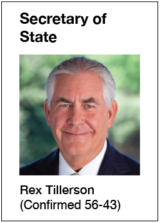
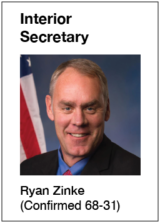
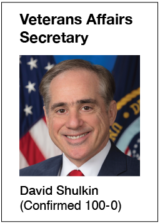
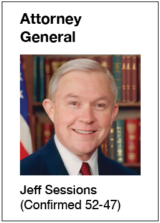
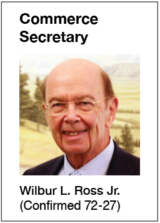
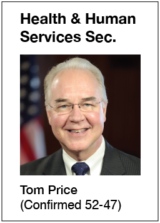
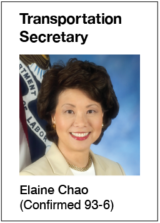
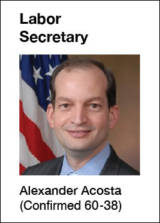
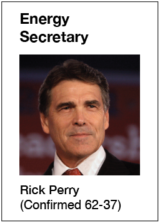
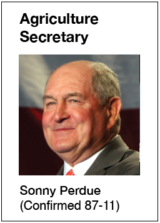
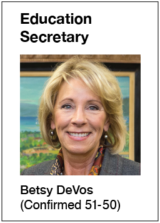
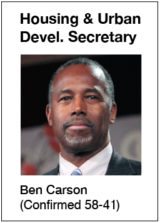
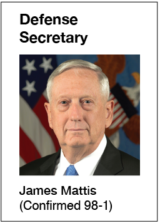
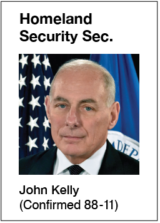
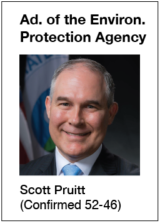
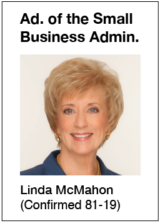
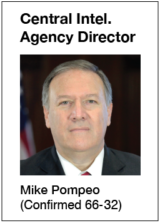
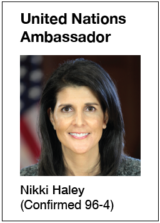
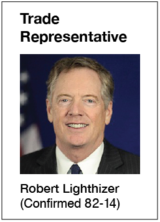
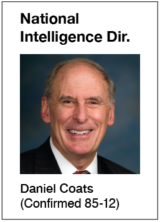
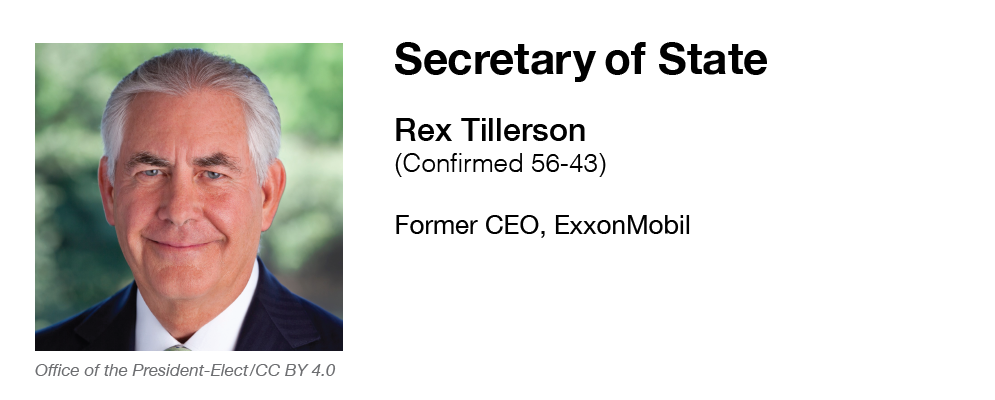
The secretary of state is the highest-ranking member in the Cabinet, and as the nation's top diplomat, is responsible for advising the president on foreign matters, and carrying out the administration’s foreign policy through the U.S. Department of State and the Foreign Service. This position oversees 30,000 employees in almost every country in the world, with a budget of roughly $35 billion.
As the face of U.S. foreign policy, the secretary of state often plays a key role negotiating international agreements on a wide range of issues, including the environment, security and nuclear weapons. As secretary of state under President Obama, John Kerry played a large role advancing international climate change policies -- including the 2015 Paris climate agreement -- as well as negotiating a major nuclear deal with Iran.
During his Senate confirmation hearing, Tillerson was questioned about his ties to Russian President Vladimir Putin, and potential conflicts of interest he could face as the former CEO of the world’s largest oil and gas company.
Among the first Cabinet members to be confirmed, Tillerson must now perform a tricky balancing act in maintaining strong relations among America’s allies while also representing a president whose support of isolationist policies has ruffled feathers around the world.
Although Tillerson does side with Trump on many issues, he did express divergent views from his boss during his confirmation hearing, voicing support for NATO, action on climate change and continued economic sanctions against Russia.
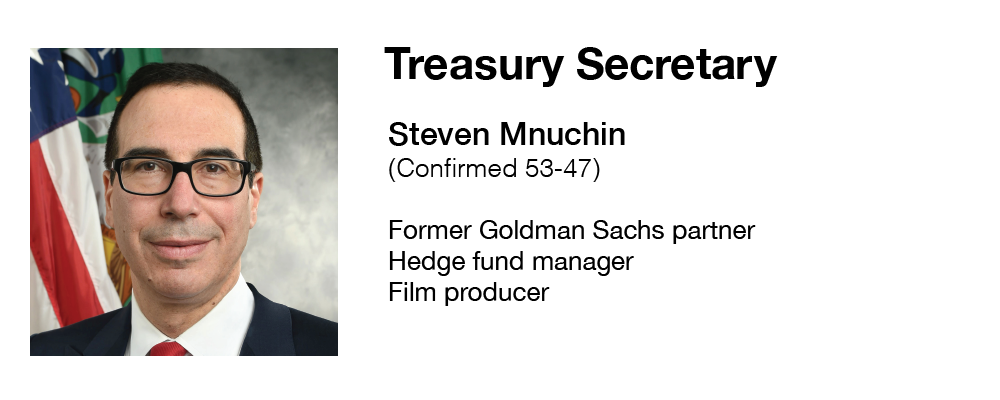
As the principal economic adviser to the president, the Treasury secretary tracks money and financial matters of national interest. Among other duties, the secretary is a key adviser and spokesman on trade deals, the public debt and tax reform. He manages 10 special bureaus, including the Internal Revenue Service (IRS) and the U.S. Mint (the secretary’s signature is on all new printed money), and oversees more than 100,000 employees and a budget of roughly $13 billion.
This position is often in the spotlight in times of financial crisis, as was the case during the economic recession in 2008-2009 and the decision to bail out the banks. Alexander Hamilton served as America’s first (and arguably most famous) Treasury secretary, responsible for consolidating the debt of the 13 colonies after the Revolutionary War.
Like Tillerson, Mnuchin was also probed by the Senate on his business dealings and personal finances. Among other things, he was strongly criticized by Democrats for his failure to disclose nearly $100 million in assets, as well as profits he made on foreclosures during the 2008-2009 economic collapse. Democrats on the Senate Finance Committee twice boycotted a vote on his confirmation – but in a rare move, Republicans sent his nomination to the full Senate without their approval.
Although Mnuchin doesn’t have any prior experience in government, he will likely have a strong hand in the president’s plans to rewrite the tax code, roll back financial regulations and renegotiate international trade policies.
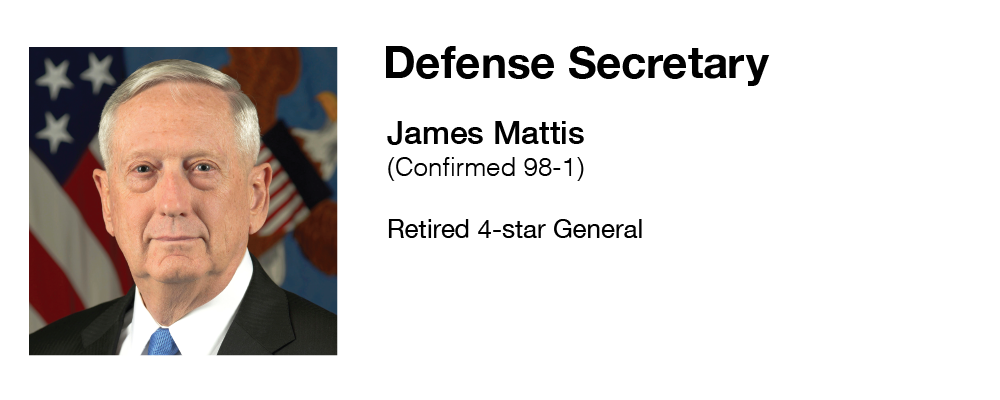
Second only to the president in military authority, the Defense secretary exercises “command and control” over the U.S. Armed forces (Army, Marine Corps, Navy and Air Force). The position oversees the Department of Defense, the largest U.S. government agency, with more than two million soldiers and civilians around the world and a budget of roughly $600 billion per year (the largest of any military force in the world) -- which Trump wants to increase by $54 billion.
The top adviser on decisions regarding U.S. military strategy and actions, this position is particularly important during times of war. Under President George W. Bush, Defense Secretary Donald Rumsfeld led the planning and execution of the 2001 invasion of Afghanistan (immediately following the Sept.11 terror attacks) and the 2003 invasion of Iraq.
Mattis, a retired 4-star general, is one of only a small handful of Trump’s Cabinet nominees to receive broad bipartisan support. During his confirmation hearing in the Senate Armed Forces Committee, he advocated stepping up military attacks on ISIS in the Middle East, in line with Trump’s proposed policies. However, he broke with the president in declaring Russia a major threat to U.S. security.
Mattis recently traveled to Brussels to advance Trump’s plan to reform NATO, an international military alliance. The administration is threatening to alter the U.S. relationship with the organization if other countries do not increase their spending budgets to 2 percent of total GDP, as promised. The U.S. currently spends more than twice as much as all other NATO countries combined.
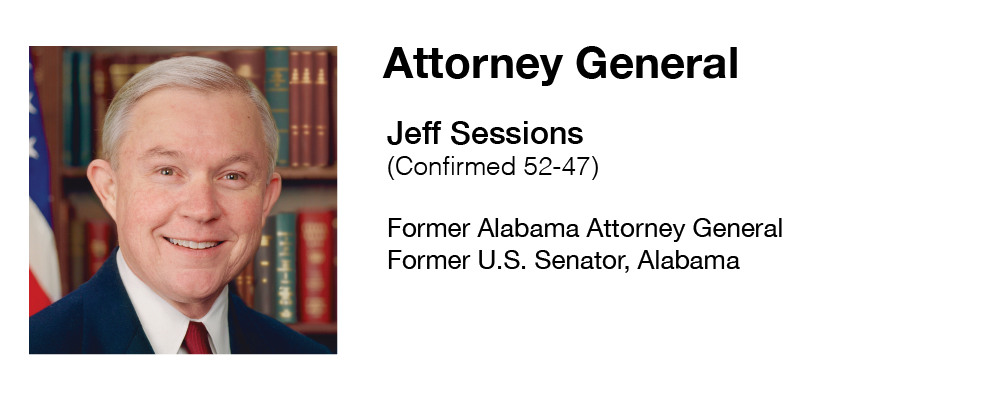
As the nation’s chief law enforcement officer and lawyer, the attorney general oversees the U.S. Department of Justice, which is comprised of 40 agencies, including the Federal Bureau of Investigations, the Federal Bureau of Prisons, the Drug Enforcement Agency and immigration courts.
The attorney general has oversight on a wide range of federal crimes, and as such can play a broad role in shaping national policy. During the Obama administration, the attorney general’s office (led by Eric Holder and Loretta Lynch) prioritized its focus on criminal justice reform by investigating multiple police departments, reducing the enforcement of certain drug laws and phasing out the federal use of private prisons.
During his Senate hearing, Sessions faced intense opposition from Democrats, mostly because of his staunch conservatism and mixed record on civil rights. Most notably, as a U.S. attorney in Alabama in 1985, he prosecuted three African-American civil rights activists, accusing them of voter fraud. The following year he was nominated to be a federal district judge, but rejected by the Senate.
As attorney general, Sessions will be in charge of advancing and defending key aspects of Trump’s “law and order” criminal justice platform and enforcing his tough immigration policies.
One of Sessions’ first actions was to reverse the Obama administration’s plan to end private prisons. He has also hinted at more support for law enforcement officials and tougher enforcement of drug laws, including heightened enforcement of marijuana (which is legal, to varying degrees, in 28 states), though no official plans have been released to date.
Less than a month into the job, though, Sessions found himself under fire following a Washington Post report that he met twice last year with Russia's ambassador to the United States, a nugget he failed to disclose during his confirmation hearing. Amid mounting pressure, Sessions on March 2 announced that he was recusing himself from any current or future investigation into Russian interference in the 2016 presidential election. Meanwhile, top Democratic leaders, including Nancy Pelosi and Chuck Schumer -- the House and Senate minority leaders -- called for Sessions to resign.
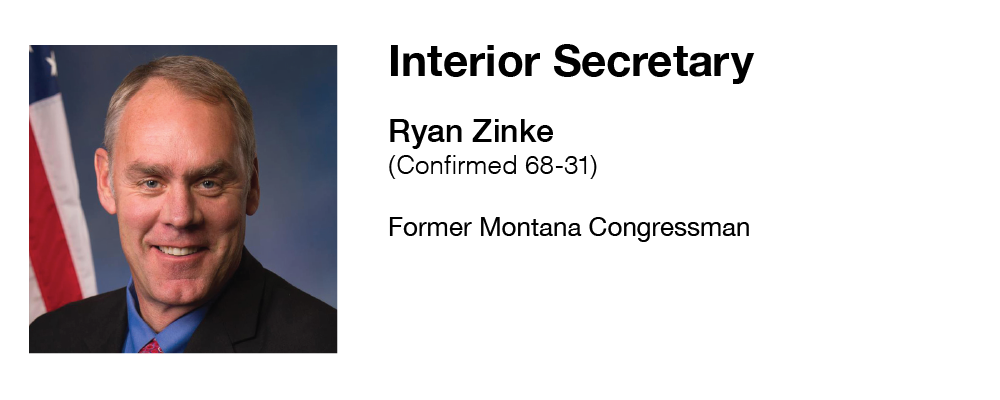
The Department of Interior is the principal conservation agency of the United States. The secretary oversees management and conservation of millions of acres of federal land and natural resources (about 20 percent of all U.S. land) through agencies including the Bureau of Land Management, the U.S. Geological Survey and the National Park Service. The department has a budget of roughly $16 billion, although it also raises billions from activities such as “energy, mineral, grazing and timber leases as well as recreational permits and land sales.”
The secretary plays a key role in controlling development of the county’s natural resources - over 20 percent of natural gas and oil and 40 percent of the nation’s coal is mined from federal lands. The secretary is also a key communicator with the public in regard to the administration’s official policy positions on issues like climate change and natural resource management.
Zinke was confirmed by the Senate on March 1 with less rancor than some of Trump's other nominees. At his confirmation hearing, the former Montana congressman, who has previously questioned climate science, said he now believes that humans do have an "influence" on climate.
He also said he opposes selling federal land to states or private owners, even though he voted in Congress to ease those same rules.
But Zinke also made his support quite clear for expanding leases to oil and gas development on public land as a way of boosting domestic energy production, a clear departure from the Obama administration's efforts to scale back drilling on federal land.
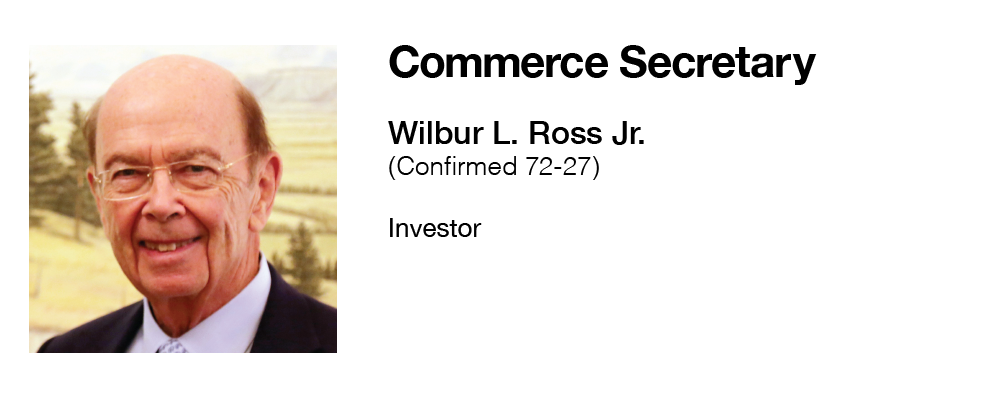
The Commerce secretary is in charge of promoting U.S. business interests domestically and abroad and “promoting economic development and technological innovation.” With 38,000 employees and a budget of roughly $6.5 billion, the department includes 12 special bureaus with wide-ranging duties, from economic and demographic data collection (U.S. Census Bureau) to weather monitoring (National Oceanic and Atmospheric Administration).
Penny Pritzker, former Commerce secretary under Obama, advanced a number of public-private partnerships in an effort to boost U.S. manufacturing.
At his Senate subcommittee hearing, Ross largely backed President Trump’s stance on trade, despite having made much of his fortune by opening factories overseas. He says that as Commerce secretary, he’ll support Trump’s agenda to toughen international trade policies and craft agreements that protect and create more jobs for American workers.
Ross also wants to crack down on what he calls China’s unfair trade practices and, like the president, pledges to make bold changes to the North American Free Trade Agreement (NAFTA). At his confirmation hearing, Ross said: “We cannot afford trade that is inherently bad for American workers and for American businesses.”
Traditionally, the Commerce secretary has less influence on economic policy than the Treasury secretary and other White House economic staff. Many political observers, though, predict that Ross will take on an expanded role in the Trump administration, given the president’s focus on redrawing trade agreements.
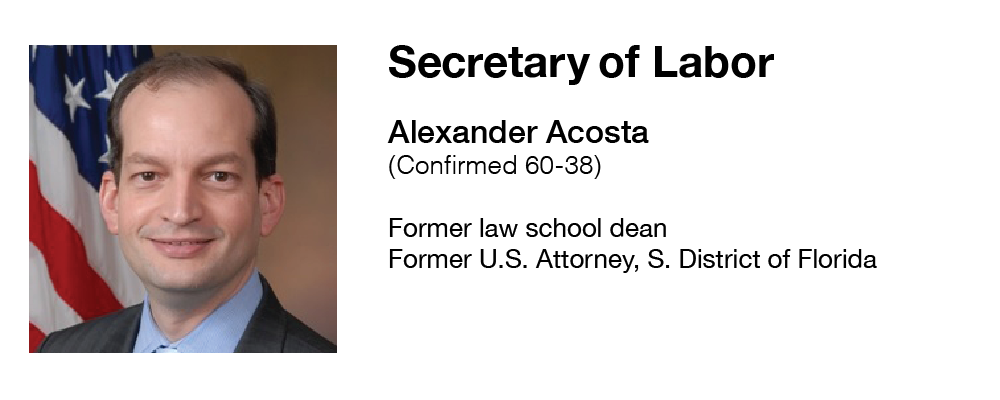
The Labor secretary heads a department that oversees workplace standards, worker protections, job training programs and employment statistics (Bureau of Labor Statistics).
The secretary can be involved in mediation between large employers and their employees - for example, Labor Secretary Tom Perez (under Obama) settled a dispute between workers, unions and management at Verizon during his tenure. Perez also proposed changes to the Fair Labor Standards Act, which establishes minimum wage, overtime pay and other important employment standards.
Acosta is Trump’s second pick for the post - Andrew Pudzer, the first, withdrew his nomination amid controversy. Considered a more moderate candidate with broader bipartisan support, Acosta is in charge of advancing Trump’s agenda to boost job development and reduce workplace regulations and union influence.
Formerly the dean of Florida International University’s law school, Acosta was also briefly a member of the National Labor Relations Board under President George W. Bush and then went on to serve as U.S. attorney in the Bush's Justice Department.
Acosta is the only Latino member of Trump's Cabinet.
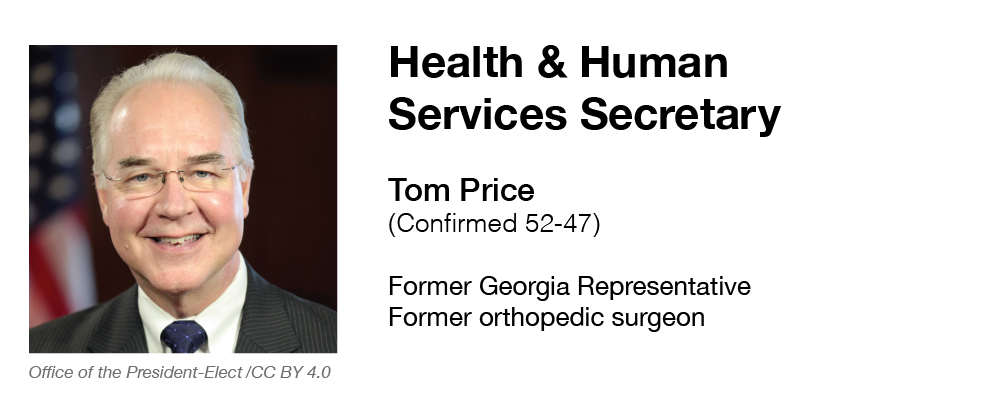
UPDATE (Sept. 29): Tom Price resigned on Sept. 29, amid sharp criticism over spending hundreds of thousands of taxpayer dollars on private charter flights. In January 2018, the Senate confirmed Alex Azar, the former president of the U.S. arm of pharmaceutical giant Eli Lilly & Co. According to NPR: "Azar will oversee the Food and Drug Administration, which regulates prescription drugs including those produced by his former employer. He'll also oversee Medicare and Medicaid, which together spend hundreds of billions of dollars each year on prescription medications."
The Health and Human Services secretary is responsible for carrying out the administration’s plans on health, welfare and other income security programs. The post oversees a huge budget of over $1 trillion and 11 operating divisions including the Food & Drug Administration, Centers for Disease Control and Prevention, the National Institutes of Health and the Centers for Medicare and Medicaid Services (which administers health care for over 130 million Americans).
The Affordable Care Act, or "Obamacare," greatly expanded the powers of this position, allowing the secretary to influence the implementation of important details of the law, including how Medicaid funds are distributed to the states.
Among other duties, Price will be tasked with implementing Trump’s plan to “repeal and replace” Obamacare. Although he has been a strong critic of the law in the past, and advocates for “free-market” solutions, he has not revealed a comprehensive plan for reform to date.
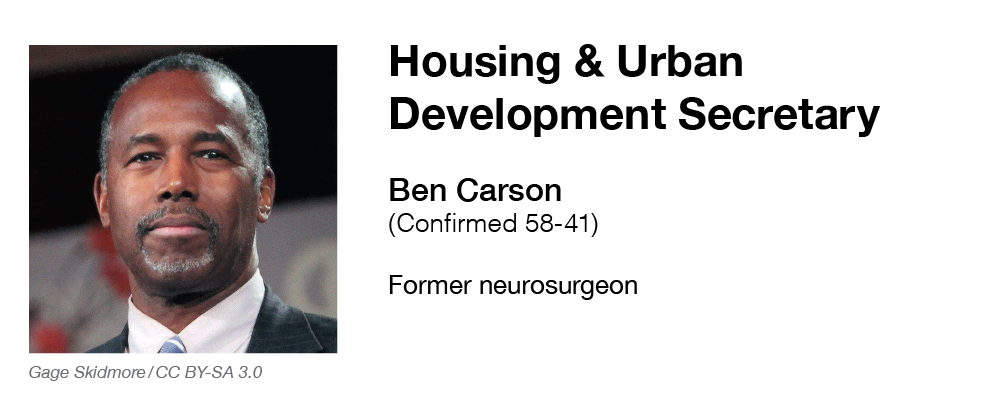
The secretary leads the Department of Housing and Urban Development (HUD), which oversees public housing, fair-housing laws, home loan programs for lower- and middle-income families, and administers community development grants. The department operates on an annual budget of nearly $50 billion.
The bulk of the department’s budget goes toward providing housing assistance, including public housing, to over 4.5 million low-income families across the country.
Carson, a retired neurosurgeon, who made his own bid for president last year, grew up in a low-income neighborhood in Detroit (though, not public housing) and is Trump’s only African-American Cabinet pick. He was confirmed by the Senate on March 2, despite being criticized by Democrats for having no prior experience in government or housing policy.
Although known for his comments urging an end to reliance on public assistance, Carson acknowledged the importance of “safety net” programs during his Senate hearing. His vision for the agency includes expanding private sector involvement in public housing and community development programs.
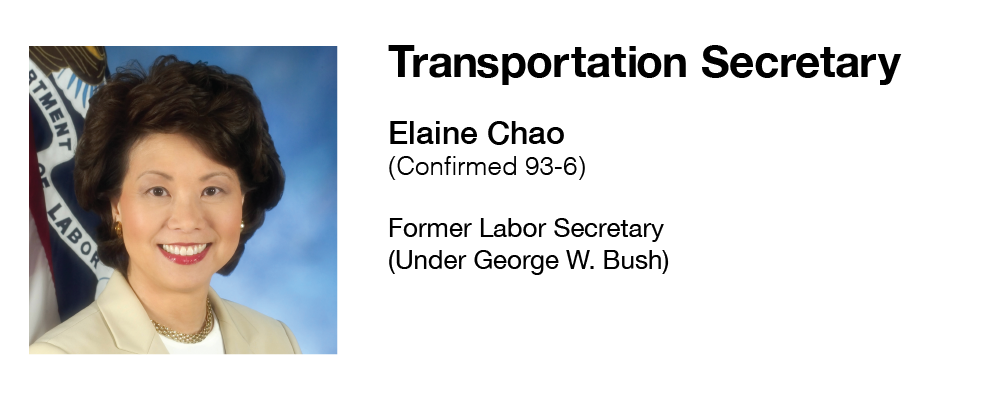
The Transportation secretary heads -- you guessed it -- the Department of Transportation. With a budget of nearly $100 billion, the department includes the Federal Aviation Agency, Federal Highway Association, the National Highway Traffic Safety Administration and eight other transportation agencies.
Under the American Recovery and Reinvestment Act, which Obama signed into law in 2009 to help jump-start the free-falling economy, the department received a major boost for road and bridge repair projects, transit expansion and new transportation facilities. A major aspect of the secretary’s job involves allocating funds, setting timelines and proposing financing options for transportation projects across the country.
The wife of Senate Majority Leader Mitch McConnell (R-KY), Chao is one of the few Cabinet members who received broad support in the Senate, largely due to her experience as Labor secretary under President George W. Bush. As Transportation secretary, Chao will be one of the key members of Trump’s cabinet tasked with advancing his campaign pledge to invest $1 trillion into roads, bridges and other infrastructure.
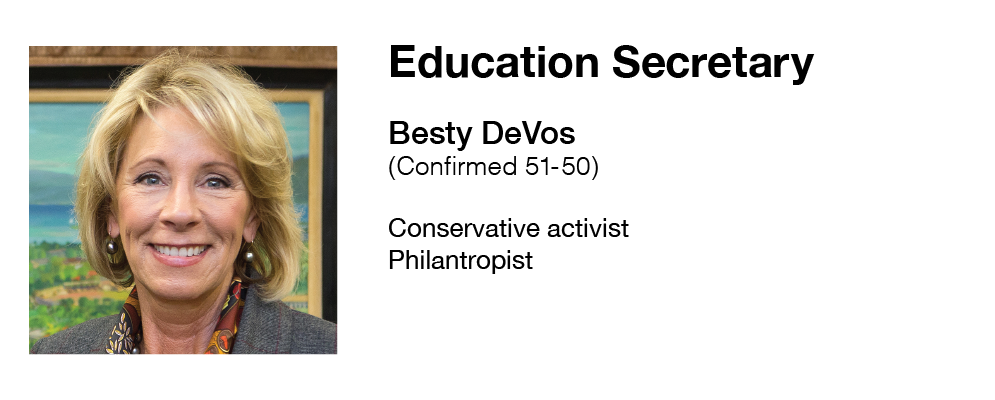
As the head of the Department of Education (the smallest cabinet-level department), the Education secretary advises the president on federal education policies and administers federal aid to local schools. The DOE also administers Pell Grants, which account for the largest share of the department’s budget, a nearly $23 billion program that provides financial aids to lower-income college students.
Although most public and charter k-12 schools receive the brunt of their funding from local and state taxes, a small but notable amount comes from the federal government (and is largely directed at low-income families). The DOE is also tasked with handling discrimination cases though its Office of Civil Rights. Notably, the ACLU sued the department in 2014 on behalf of a transgender student who was blocked by his school from using the bathroom that corresponded with his gender identity.
DeVos, a billionaire philanthropist, was sharply criticized during her Senate hearing for her lack of experience and knowledge of public education standards. Her confirmation has been regarded as the most controversial of Trump’s picks to date, with Vice President Mike Pence breaking a Senate tie to cast the deciding vote in her favor.
Trump has repeatedly suggested reducing or eliminating the Department of Education, favoring state and local administration of schools (rather than federal). While it appears the department will remain for now, DeVos is not supportive of traditional public education; she strongly advocates for school voucher programs, which would expand alternatives to public education (like charter schools), and allow K-12 students to attend private and religious schools funded with public dollars.
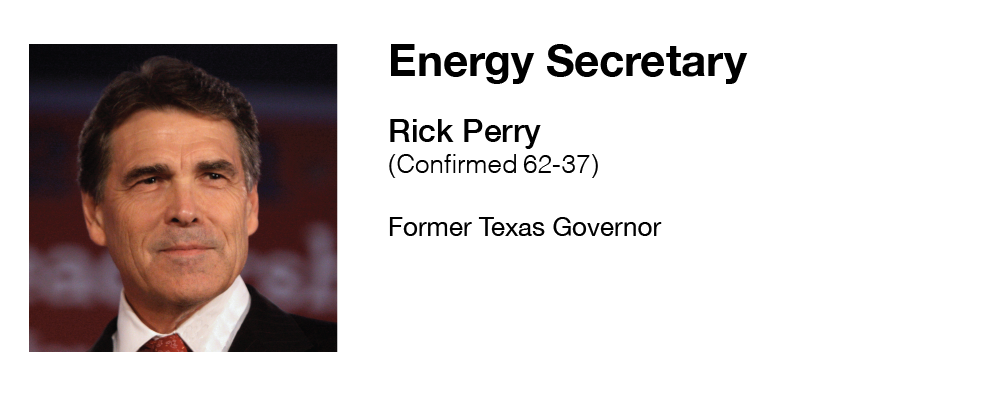 The secretary leads the Department of Energy, with a focus on promoting new technologies, providing related education and overseeing nuclear energy programs. The secretary also works with heads of federal intelligence agencies to closely monitor compliance with domestic and international nuclear agreements. The majority of the department's budget is allocated to national security (i.e. nuclear weapon programs).
The secretary leads the Department of Energy, with a focus on promoting new technologies, providing related education and overseeing nuclear energy programs. The secretary also works with heads of federal intelligence agencies to closely monitor compliance with domestic and international nuclear agreements. The majority of the department's budget is allocated to national security (i.e. nuclear weapon programs).
The department was created in the early 1970s (under President Jimmy Carter) in response to an oil embargo that nearly quadrupled the price of oil, sending the global and national energy sectors into shock. President’s generally set the agenda for Energy secretaries - under Obama, the department focused on clean energy research and development.
During his 2012 presidential run, Perry actually vowed to eliminate the Energy Department (and notoriously forgot the name of it during a primary debate). More recently, he's demonstrated apparent confusion about the responsibilities he would have as secretary. Nevertheless, Perry cleared the Senate Committee on Energy and Natural Resources and was confirmed by the full Senate on March 2.
As Governor of Texas, Perry was an advocate for the fossil fuel industry and maintains strong personal and business ties to major Texas oil companies. He was, however, also supportive of some renewable energy development.
In keeping with Trump's priorities to expand domestic energy production by increasing fossil fuel production, Perry will likely steer the department away from the larger Obama-era focus on renewable energy development.
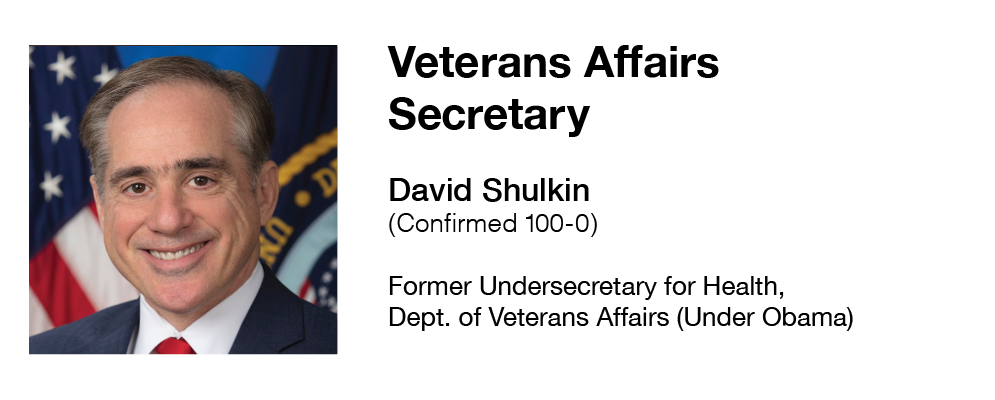
As the head of the Department of Veterans Affairs (VA), the secretary oversees health care and other benefits for people who have served in the military. The VA employs roughly 300,000 employees and controls a budget of about $150 billion.
The department was created in 1930 (12 years after World War I) and grew exponentially following a sharp rise in the number of U.S. veterans after World War II. The VA health care system (one of three subdivisions of the department) is the largest integrated health care system in the U.S., providing care for roughly 9 million veterans each year.
A holdover from the Obama administration, Shulkin is Trump’s only nominee to date approved unanimously by the Senate. As secretary, he will be tasked with improving care for veterans, which Trump says was sorely neglected under the Obama administration. Shulkin has promised “major reform and transformation of the VA” including increased options for veterans to receive private sector medical care.

UPDATE (July 28): After a short stint leading the Department of Homeland Security, Kelly was appointed by Trump to be White House chief of staff, replacing Reince Priebus. Elaine Duke initially served as acting secretary of the department. On Dec. 5, the Senate confirmed Kirstjen Nielsen by a vote of 62-37. Nielsen previously served on George W. Bush’s homeland security council, worked under Kelly at the DHS earlier this year, and most recently was his chief of staff at the White House.
As head of the Department of Homeland Security, the secretary is responsible for protecting domestic safety. The department’s broad responsibilities include fighting terrorism, securing the border, immigration and customs enforcement, cybersecurity, and disaster prevention and management.
The department was created under President George W. Bush to consolidate homeland security efforts after the 9/11 terrorist attacks. It’s comprised of seven agencies, including Immigration and Customs Enforcement and the Transportation Security Administration (airport security).
Kelly will oversee the third largest federal department, and be responsible for advancing some of Trump’s controversial actions on immigration and border security. During his confirmation hearing however, Kelly appeared to break with his boss, downplaying the importance of a U.S.- Mexico border wall and pushing back on proposed policies to restrict immigration of Muslims and to revive torture techniques in the fight against terrorism.
He also recently promised more moderate laws on deportations and travel following public outcry in response to a series of executive orders signed last month by Trump.
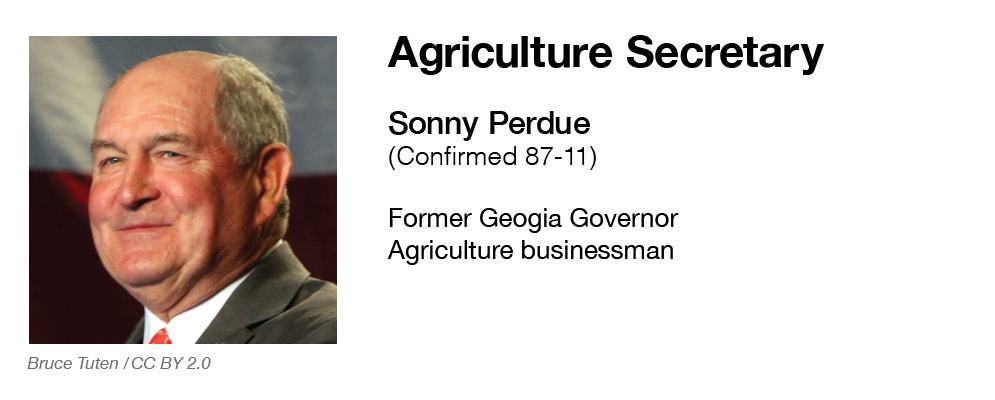
The Department of Agriculture oversees the country’s massive farming industry. Among other things, the department provides subsidies and support to farmers and agribusiness, nutritional aid to low-income families and it administers agricultural trade policies.
Roughly 80 percent of the department’s budget goes to food assistance programs (formerly known as food stamps) which provide for more than 40 million low-income people across the nation.
The department also oversees the U.S. Forest Service, which manages nearly 200 million acres of public land.
As head of the department, Perdue, a former agricultural businessman, will likely look to reduce farming industry regulations and renegotiate agricultural trade agreements.
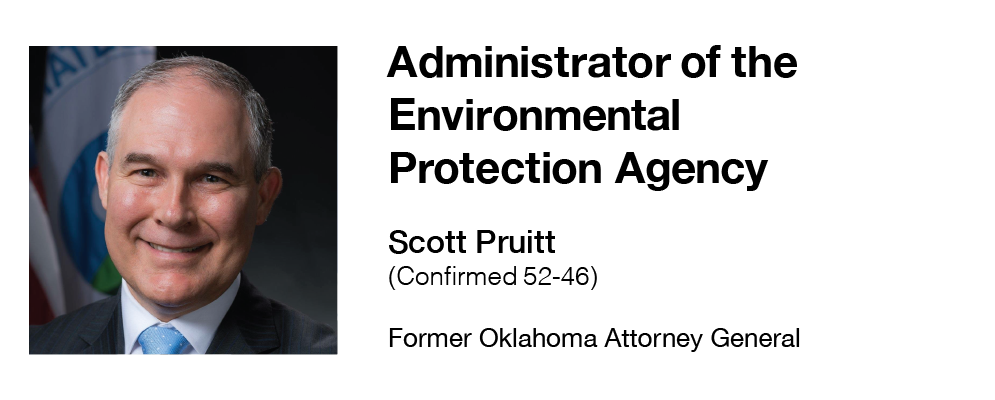
The EPA administrator is responsible for guiding federal environmental policy and enforcing the Clean Air and Clean Water Acts and other environmental regulations. Under the Obama administration, the agency took steps to combat climate change by trying to regulate carbon emissions and promote renewable energy.
Pruitt is a self-described “leading advocate against the EPA activist agenda.” As Oklahoma attorney general, he sued the agency multiple times, and has made it clear that he wants to reform the agency by significantly reducing its reach. Pruitt also has strong ties to the fossil fuel industry, and says he wants to roll back federal environmental regulations, particularly when they hinder domestic energy production. He is a strong advocate for state and local control over environmental laws.
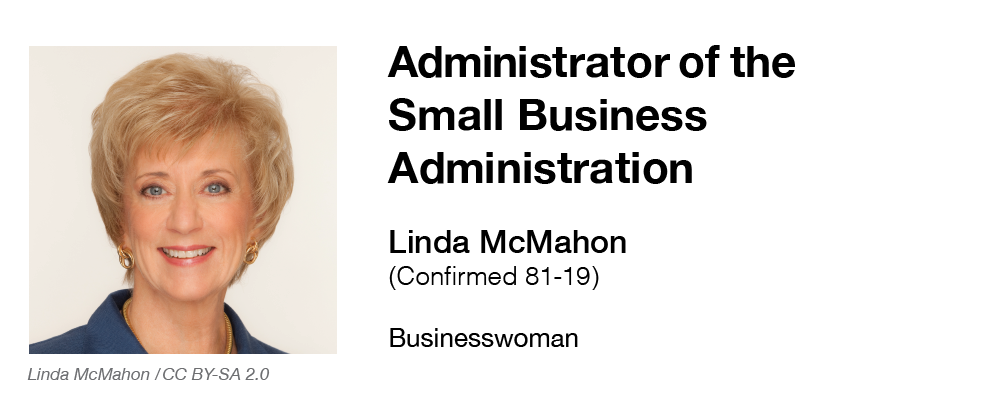
The Small Business Administration is responsible for providing loans, securing government contract work and generally advocating for small business interests.
The former CEO of World Wrestling Entertainment, McMahon is a billionaire businesswoman with no government experience. A key player on Trump’s economic team, she is tasked with cutting back federal regulations on small businesses, promoting job growth and supporting entrepreneurship.
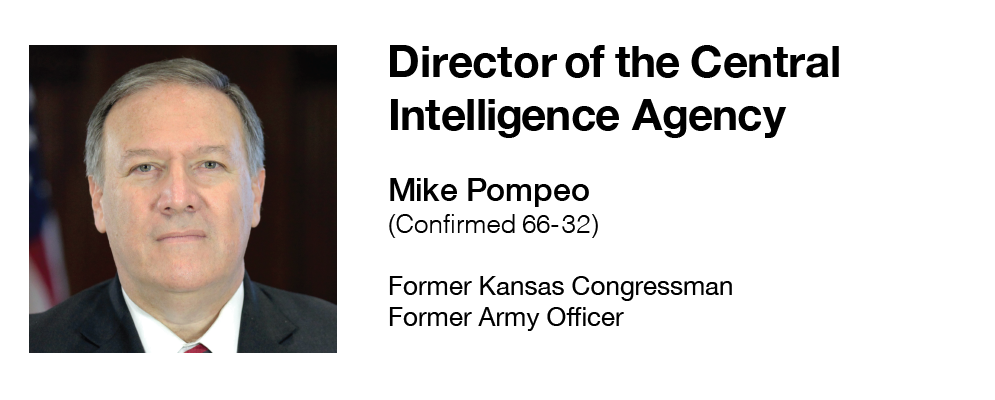
The head of the CIA oversees a huge network of intelligence agents positioned around the world, with the intent of protecting national security. The director is responsible for providing regular intelligence briefings to the president and his staff.
Pompeo took over the CIA in the midst of a strained relationship between the agency and the White House. Trump had initially dismissed agency intelligence reports that Russian agents likely hacked the U.S. presidential election. While supportive of the president in general, Pompeo says he backs the CIA’s Russia findings. During his confirmation hearings, Pompeo also said that he would not resume the use of enhanced interrogation techniques (like waterboarding) that Trump has advocated for.
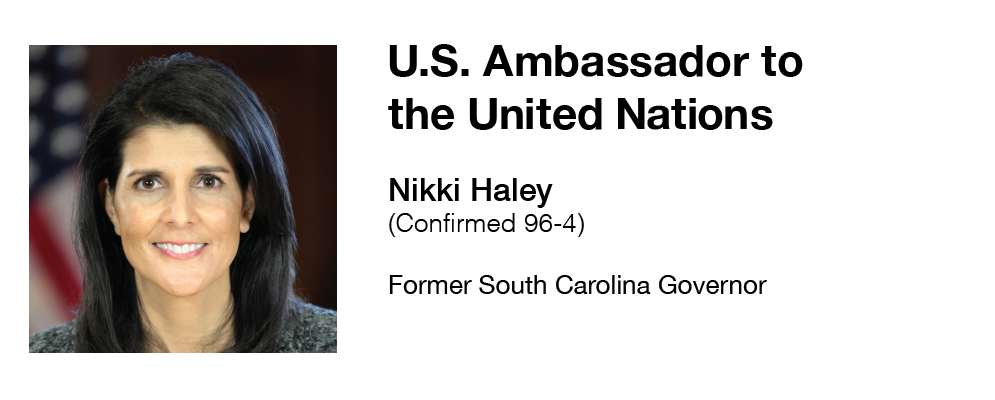
Although the secretary of state takes the lead on establishing foreign policy, the UN ambassador is responsible for interpreting U.S. policy positions and building international support in the UN’s General Assembly and Security Council.
Unlike many of Trump’s nominees, Haley received broad support in the Senate and was confirmed quickly, despite her lack of foreign policy experience. Although she agrees with Trump on a number of key foreign policy issues, including opposition to the Iran Nuclear deal, she has also shown a willingness to disagree with him on certain issues, including her denunciation of Russian President Vladimir Putin’s “acts of aggression” in Eastern Ukraine.
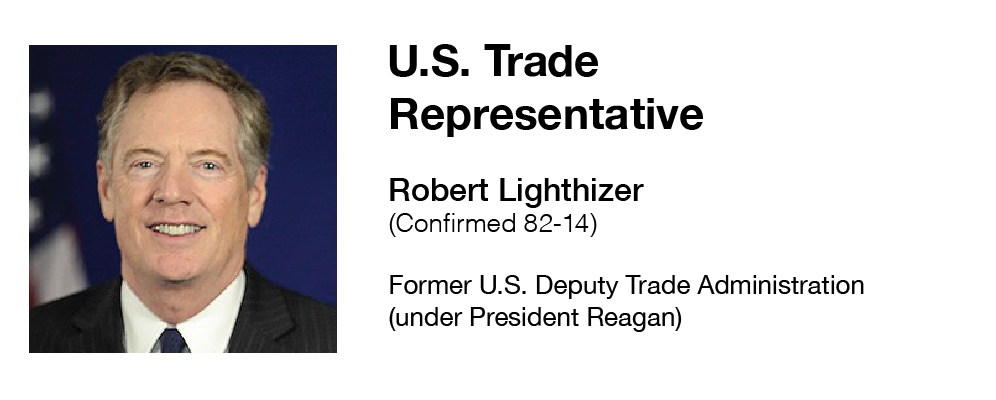
The trade representative is member of the president’s economic team, advises on domestic and international trade policies.
Lighthizer shares Trump’s protectionist approach to the U.S. economy. With the goal of protecting American jobs, he is tasked with negotiating and enforcing existing trade agreements, forging new ones, and potentially raising import taxes. Lighthizer will likely play a key role in Trump’s promise to renegotiate the terms of the North American Free Trade Agreement.
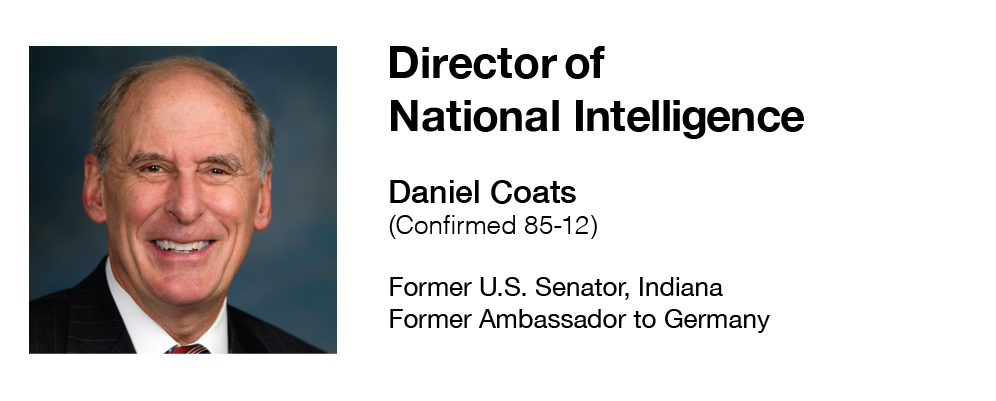
The intelligence director is responsible for coordinating the intelligence gathering and analysis of the country’s 16 civilian and military spy agencies, including the CIA, NSA and FBI. Created in 2004, partly in in reaction to criticism that the nation’s spy agencies had failed to detect and prevent the 9/11 terrorist attacks, the post is intended to be the president's primary interpreter on national intelligence.
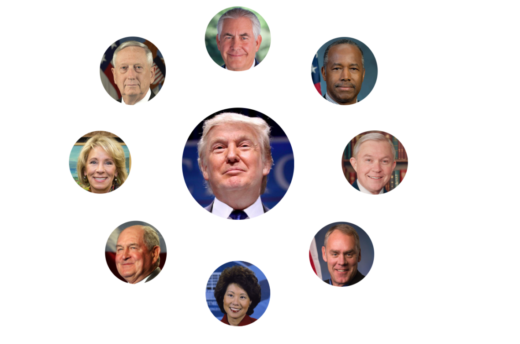































 The secretary leads the Department of Energy, with a focus on promoting new technologies, providing related education and overseeing nuclear energy programs. The secretary also works with heads of federal intelligence agencies to closely monitor compliance with domestic and international nuclear agreements. The majority of the department's budget is allocated to
The secretary leads the Department of Energy, with a focus on promoting new technologies, providing related education and overseeing nuclear energy programs. The secretary also works with heads of federal intelligence agencies to closely monitor compliance with domestic and international nuclear agreements. The majority of the department's budget is allocated to 







